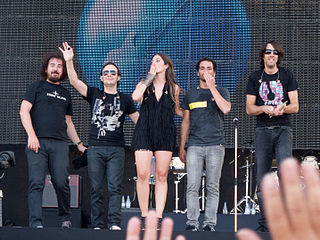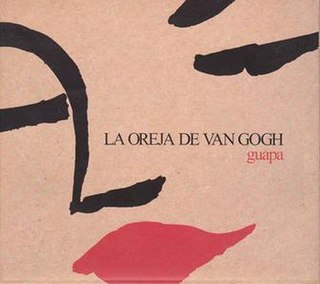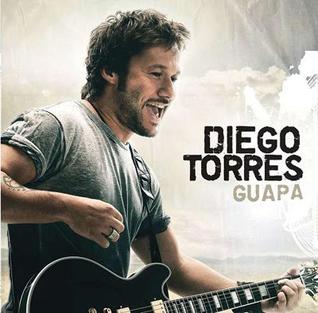Hollywood usually refers to:
Sweet Dreams or Sweet Dream may refer to:
A shelter is an architectural structure or natural formation providing protection from the environment
Unknown or The Unknown may refer to:

La Oreja de Van Gogh is a Spanish pop band from Donostia-San Sebastián, Spain. The band's lyrics and compositions are written primarily by Xabi San Martín, and additionally by Pablo Benegas and Amaia Montero. The lyrical themes of their songs typically include love, friendship and relationships. Since their debut, they have sold more than 8 million albums worldwide.
Damned or The Damned may refer to:

Diego Antonio Caccia, known as Diego Torres, is an Argentine pop singer, songwriter, musician, and actor. His music is generally categorized as Latin pop, tropical, and rock & roll. He is a member of the Latin Songwriters Hall of Fame, and the son of the Argentine icon Lolita Torres.

Guapa is the fourth studio album released on April 25, 2006, by Spanish Pop rock band La Oreja de Van Gogh. On December 5, 2006, Más Guapa was released exclusively in Spain and Mexico. Two months later, on February 13, 2007, the album was also released in Chile. Más Guapa includes a second disc of previously unreleased material from the Guapa sessions, as well as from recording sessions of previous albums. The album won a Latin Grammy Award for Best Pop Album By a Duo or Group. Guapa is the band's last album with Amaia Montero as lead singer.

"Muñeca de trapo" is the first single from the fourth studio album of La Oreja de Van Gogh, Guapa. The song is known for its heavy sound, strong beat, and surging guitars. Its lyrics, in comparison to other songs by the band, deal with a more serious theme, in which a disregarded woman compares herself to a rag doll when she cannot express her feelings for her loved one, even though she loves him deeply, claiming "eres todo lo que mas quiero, pero te pierdo en mis silencios".
To Live and Die in L.A. may refer to:

Rafael Reig is a Spanish writer born in Asturias in 1963. He studied philosophy and humanities in Madrid, and then in New York City, completing his PhD in literature on 19th century literary depictions of prostitution.

"Guapa" is a Latin pop song co-written and performed by the Argentine pop singer-songwriter Diego Torres and released on February 15, 2010, as the first single from his seventh studio album.

Gloria Piedimonte, also known as La Guapa, was an Italian singer, actress, dancer, and television personality.

The discography of Spanish pop rock band La Oreja de Van Gogh consists of eight studio albums, three live albums, two compilation albums, one extended play, one box set, thirty five singles and twenty six music videos. The band have sold over 8 million records worldwide, making them the best selling pop band in Spain and the country's most influential pop group since Mecano. La Oreja de Van Gogh released their debut studio album Dile Al Sol on May 18, 1998. It was a commercial success in Spain, eventually peaking at number 1 and being certified 7 times Platinum in the country. The band's second studio album, El viaje de Copperpot, was released on September 11, 2000. It is the band's most successful album in Spain; selling more than 1,200,000 copies there, becoming Sony's Spain second highest selling album in history. It also catapulted the band's fame and success in Latin America. The first three singles reached number 1 in Spain, Mexico and most Latin American countries.
The 45th Annual Martín Fierro Awards, presented by the Asociación de Periodistas de la Televisión y Radiofonía Argentina (APTRA), was held on June 14, 2015. During the ceremony, APTRA announced the Martín Fierro Awards for 2014 Argentine television and radio programs.

Saleem Haddad is an author, filmmaker and aid worker of Iraqi-German and Palestinian-Lebanese descent, whose debut novel Guapa was published in 2016.
This page is based on this
Wikipedia article Text is available under the
CC BY-SA 4.0 license; additional terms may apply.
Images, videos and audio are available under their respective licenses.








